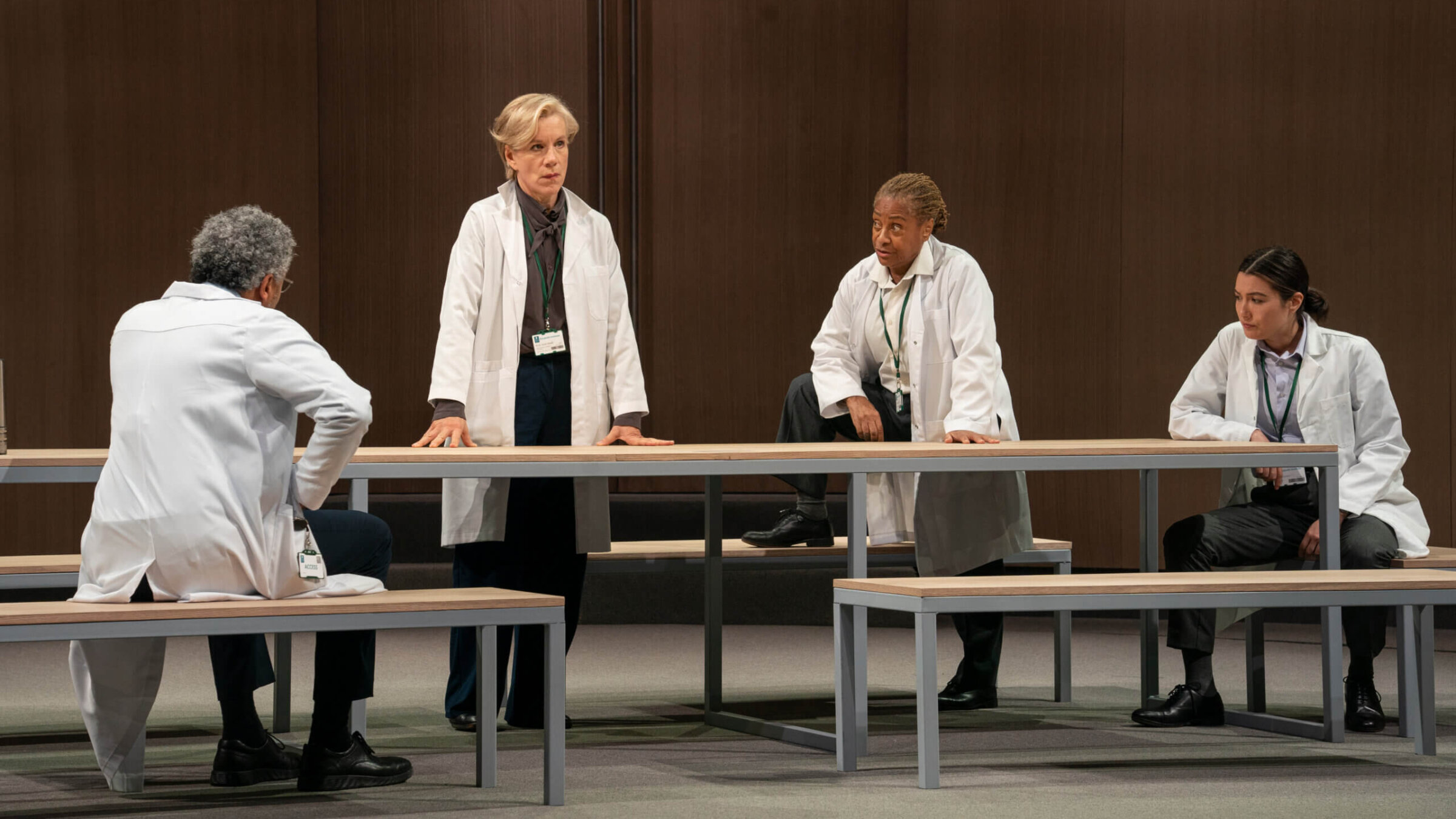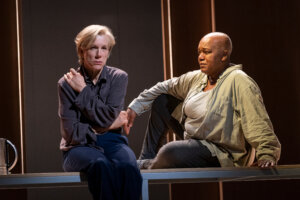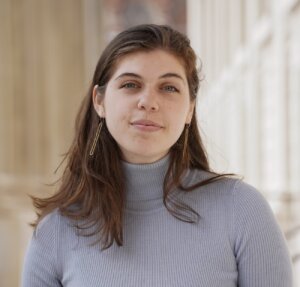In ‘The Doctor,’ a thought experiment about antisemitism goes awry
A Jewish doctor sets off a scandal of identity politics in this new play at the Park Avenue Armory

Icke’s drama of antisemitism and identity politics was adapted from Arthur Schnitzler’s 1912 play, ‘Professor Bernhardi.’ Photo by Stephanie Berger
Early on in The Doctor, Robert Icke’s new drama at New York’s Park Avenue Armory, two surgeons get into a heated debate about a promotion. The first doctor, a white man, likes the optics of choosing a Black, Catholic candidate, since the hospital’s leadership is overwhelmingly white and its board is dominated by Jewish patrons. The other, Ruth Wolff, is vehemently opposed. She’d rather hire the other candidate, a white, Jewish woman, on the ground that she’s the better doctor.
Each doctor prefaces their points with the same two words: “thought experiment.” It’s a phrase that sets the tone of the whole play: The Doctor, which transferred to New York after a highly-acclaimed run on the West End, is, at its best, a thought experiment in theatrical form.
Wolff, played by a forceful Juliet Stevenson, is the head doctor at a private medical institute who enters a maelstrom after refusing to let a Catholic priest administer last rites to a 14-year-old patient dying of sepsis after a home abortion. The girl’s condition is far beyond the point of medical intervention; Wolff denies entry to the priest, sent by her parents, on the grounds that a visitor would disrupt the patient’s sedation, possibly causing her to panic and die an “unpeaceful death.”
When the news of Wolff’s decision reaches the internet, it sets off a storm. Soon, Wolff is embroiled in a public debate about identity politics amid a clash of science and faith. Central to that debate is a detail Wolff herself would rather ignore: She is a Jew.
The Doctor is, per its promotional materials, “very freely adapted” from Arthur Schnitzler’s 1912 play Professor Bernhardi. Icke’s play, like Schnitzler’s, begins with a conflict involving a Jewish doctor’s refusal to let a Catholic priest see a dying patient.
But that’s where the two plays diverge. Schnitzler, a Viennese Jew who had been a doctor himself, called Professor Bernhardi a comedy. Set in pre-World War I Vienna, his play focused on latent antisemitism and corruption, treating its hospital as a microcosm of contemporary society. Its provocative critique of Christian hegemony led it to be banned in Austria until the collapse of the Austro-Hungarian Empire in 1918, and its 1912 premiere in Berlin was met with protests from Catholics and antisemitic groups.
Icke relocates the drama to contemporary Britain, where identity politics dominate interpersonal discourse and the internet is a prime battleground for the culture wars. Where Professor Bernhardi dives deep into antisemitism, The Doctor goes intersectional. But with such a swollen scope, The Doctor loses sight of the antisemitism at its center — and undermines the sharp focus that made Schnitzler’s play strike a nerve in public discourse.
Initially, religion is at the heart of the public response to Wolff’s decision. If she weren’t a Jew, her critics argue, she would have prioritized the importance of the Catholic sacrament. Online commenters quickly jump to antisemitic tropes, invoking the Wolff’s outsized power and the interests of the hospital’s Jewish donors.
It’s in the first act, as Wolff and her colleagues struggle to control the mounting scandal, that The Doctor is most resonant. The play unfolds at the unsettling pace of a Twitter feud, and under harsh fluorescent lights, the hospital hallways and boardrooms evoked by Hildegard Bechtler’s coolly minimalist set become a claustrophobic echochamber. The production’s live underscoring by drummer Hannah Ledwidge is a particularly effective touch, providing The Doctor with an elevated heart rate throughout.
Yet as the controversy around Wolff spirals out of control, so too does the play. Throughout The Doctor, it’s clear that Wolff is under attack as a Jew; the antisemitic tropes hurled on social media in the first act turn into offline antisemitic harassment by the beginning of the second. But the degree to which that matters is complicated by the fact that her Judaism is inextricable from the rest of her identity — she’s an older white woman in a position of power.
The ensuing arguments about identity politics leads to a somewhat troubling thread of false equivalence. In the second act, a woke, post-colonial scholar who chastises Wolff about white privilege in a ridiculously satirical televised debate appears to be just as pernicious as the neo-Nazi who spray paints a swastika on her car — an approach that comes across as slick and cynical, inadvertently letting the audience off the hook from fully engaging.
In a similarly provocative vein, the production casts across race and gender. That conceit, however, remains unclear until halfway through the first act, when we learn that the priest, played by a white actor, was actually Black.
Would the audience have initially interpreted Wolff’s aggression toward him differently if the actor’s race matched the character’s? Almost certainly. But when the play’s dramatic propulsion depends on keeping the details of a situation from the audience only to reveal them after the fact, the approach feels more like outsmarting the audience for shock value than posing questions to them out of genuine interest.

For the majority of the play, it’s hard not to empathize with Wolff, the closest thing the otherwise austere production has to an emotional foothold. Where the play’s supporting characters operate primarily as figureheads for political talking points, Stevenson gives the audience glimpses of Wolff’s vulnerability, while playing her need to maintain control with a magnetic prowess. When we see her at home, Stevenson sheds Wolff’s armor with impressive agility, showing an unexpected sense of humor and tenderness.
Still, even Wolff, the most fully drawn of Icke’s characters, is slippery. In an attempt to soften her, Icke introduces a young girl she mentors, and a partner who may or may not actually be there. However, those characters’ subplots — along with a thematic thread about witchcraft that seems to serve the sole purpose of bringing the phrase “witch hunt” to mind — feel wedged into an already densely packed play.
It’s in a few fleeting interactions between Wolff and her Jewish colleagues that the play finds real poignancy. The hospital’s Jewish public relations manager lingers after witnessing Wolff in a particularly explosive argument, offering subtle sympathy. A Jewish doctor follows Wolff out the hospital door when she inevitably — spoilers — resigns.
It’s in those moments that Wolff begins to see that, despite what she may want to believe, she cannot exempt herself from being affected by identity. If only there were more of them. For a drama driven by abstract, warring ideas, The Doctor may have been more potent if only it were more human.






















